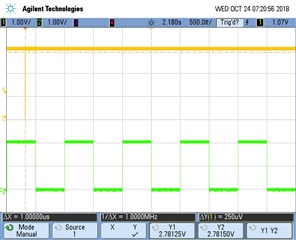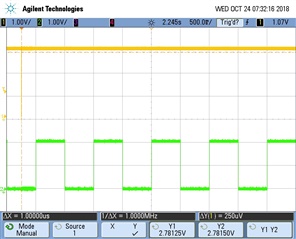Hello!
I am using the PORT event interupt sense handler to wake up the device from various pin interupts. We have in total 6 pins that need to do that.
This works fine, except for when a current pin generated an event that stays in this detected state for a while. For example, see these scope images:


The green line is a 1 hz signal from an external RTC. This sometimes needs to wakeup the device once a second (hence the interupt sense method choosen is HI to LO).
The yellow line is an interupt that needs to wakeup the device as well, but needs only to trigger an interupt when something is near (IR detection).
The problem i am facing is that during the RTC interupt from HI to LO, this IR detection interupt gets ignored, because the PORT sense event only can generate an interupt if the current pin that generated the interupt goes back to the non triggered state (AFAIK and is during debugging very apparant).
We also have a pin that is pulled LO and stays low as long as a certain cable is connected to our device, which needs to prevent the device to sleep during this event. In this case, ALL interupts from the other PORT event pins get ingnored for the set interupt event.
I tried the IN EVENT mode. That works fine for what we need, but uses way too much current during the sleep period of the device.
I tried to switch from the PORT event to the IN EVENT during wake times, but thats not ideal and gave me errors during switching.
Is there a way I can "reset" the current pin state, that generated the interupt in the PORT event, so that I can receive other interupts?
It is very important that we always have every 6 of these pins generate the interupt and that we know what pin did it.
(part of) my code:
void PIN_WAKE_ON_FTDI_IRQHandler(nrfx_gpiote_pin_t pin, nrf_gpiote_polarity_t action) // FTDI connect
{ if(pin == INTERFACE_CABLE_DETECT_PIN)
{ PM_WakedBy |= WAKE_ON_FTDI;
}
}
void PIN_WAKE_ON_CARDDT_IRQHandler(nrfx_gpiote_pin_t pin, nrf_gpiote_polarity_t action) //EM = Toetsen of IR
{ if(pin == EM_IRQ_PIN)
{ PM_WakedBy |= WAKE_ON_CARDDT;
}
}
void PIN_WAKE_ON_RTC_IRQHandler(nrfx_gpiote_pin_t pin, nrf_gpiote_polarity_t action) // WAKE_ON_RTC
{ if(pin == RTC_PCF2123_CLKOUT_PIN)
{ PM_WakedBy |= WAKE_ON_RTC;
}
}
void PM_Init(void)
{ ret_code_t err_code;
nrfx_gpiote_in_config_t nrfx_gpiote_in_config;
err_code = nrfx_gpiote_init(); // init de GPIOTE module
APP_ERROR_CHECK(err_code);
nrfx_gpiote_in_config.hi_accuracy = false; // Set hi_accu to false for PORT event
// WAKE_ON_FTDI this is a pin that stays low during placement of the cable and needs to prevent the device from sleep
nrfx_gpiote_in_uninit(INTERFACE_CABLE_DETECT_PIN);
nrfx_gpiote_in_config.sense = NRF_GPIOTE_POLARITY_HITOLO;
nrfx_gpiote_in_config.pull = (nrf_gpio_pin_pull_t)INTERFACE_CABLE_DETECT_PIN_PULL_CFG;
err_code = nrfx_gpiote_in_init(INTERFACE_CABLE_DETECT_PIN, &nrfx_gpiote_in_config, PIN_WAKE_ON_FTDI_IRQHandler);
APP_ERROR_CHECK(err_code);
nrfx_gpiote_in_event_enable(INTERFACE_CABLE_DETECT_PIN, true);
// WAKE_ON_CARDDT this is a pin that needs to detect a near detection at all times
nrfx_gpiote_in_uninit(EM_IRQ_PIN);
nrfx_gpiote_in_config.sense = NRF_GPIOTE_POLARITY_HITOLO;
nrfx_gpiote_in_config.pull = (nrf_gpio_pin_pull_t)EM_IRQ_PIN_PULL_CFG;
err_code = nrfx_gpiote_in_init(EM_IRQ_PIN, &nrfx_gpiote_in_config, PIN_WAKE_ON_CARDDT_IRQHandler);
APP_ERROR_CHECK(err_code);
nrfx_gpiote_in_event_enable(EM_IRQ_PIN, true);
// WAKE_ON_RTC this is a 1 hz interupt pin that sometimes needs to wake the device every second for a few seconds
nrfx_gpiote_in_uninit(RTC_PCF2123_CLKOUT_PIN);
nrfx_gpiote_in_config.sense = NRF_GPIOTE_POLARITY_HITOLO;
nrfx_gpiote_in_config.pull = (nrf_gpio_pin_pull_t)RTC_PCF2123_CLKOUT_PIN_PULL_CFG;
err_code = nrfx_gpiote_in_init(RTC_PCF2123_CLKOUT_PIN, &nrfx_gpiote_in_config, PIN_WAKE_ON_RTC_IRQHandler);
APP_ERROR_CHECK(err_code);
nrfx_gpiote_in_event_enable(RTC_PCF2123_CLKOUT_PIN, true);
}


